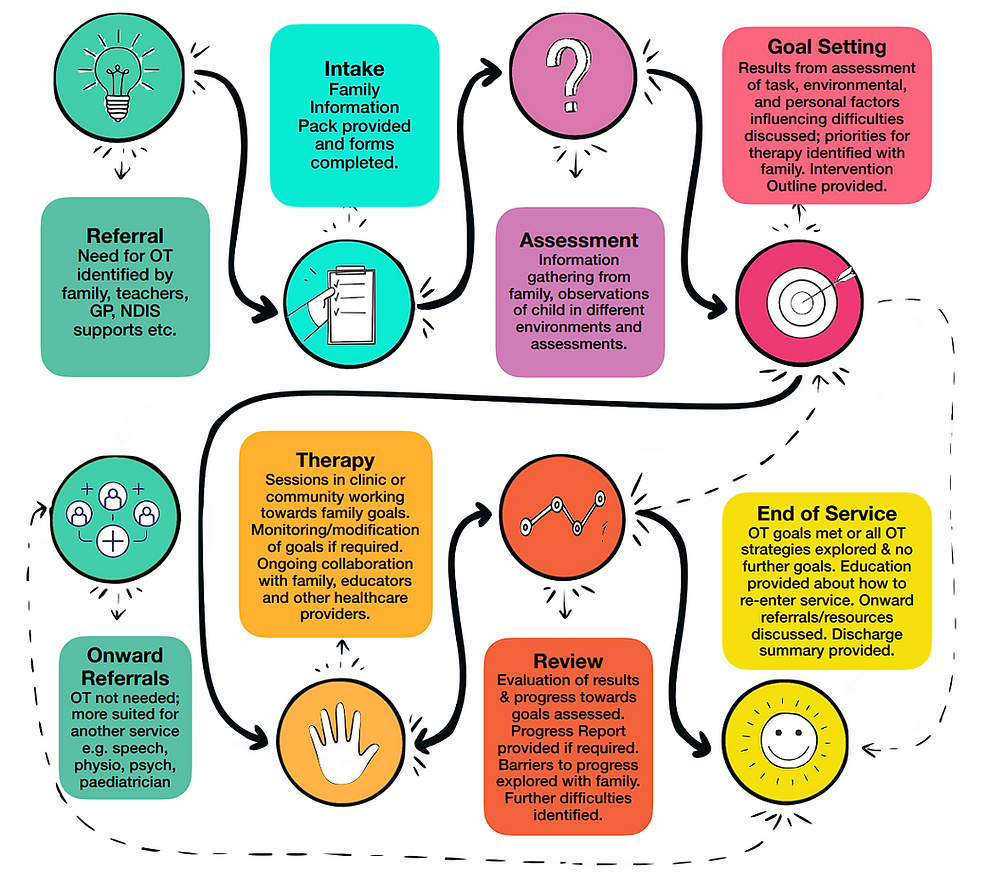
About Occupational Therapy
What do Occupational Therapist's who work with children DO?
Support families whose kids are having difficulty doing the things that they need to do in their everyday life.
Occupational Therapist's call these various activities "occupations". They encompass a range of activities that are essential for children's growth, development, learning and wellbeing. For most kids, common "occupations" include:
Play: Play is a fundamental childhood occupation that involves activities such as imaginative play, constructive play, games, and outdoor play. Play is essential for children's physical, cognitive, social, and emotional development, as it allows them to explore, learn, express themselves, and develop important skills such as problem-solving, creativity, and social interaction.
Self-Care: Self-care occupations include activities related to personal hygiene, grooming, dressing, feeding, and toileting. Learning and mastering self-care skills are crucial for children's independence, self-confidence, and ability to participate in daily routines and activities.
School and Learning: School-related occupations encompass activities such as attending school, participating in classroom lessons, completing homework, and engaging in extracurricular activities. These occupations are vital for children's educational development, academic success, and socialization with peers and teachers.
Socialisation and Relationships: Social occupations involve interactions with family members, friends, peers, and other individuals in various social settings. Developing social skills, building relationships, and participating in group activities are important aspects of childhood development that contribute to children's emotional well-being and sense of belonging.
Leisure and Recreation: Leisure occupations include hobbies, interests, sports, arts and crafts, and other recreational activities that children engage in during their free time. Participating in leisure activities promotes relaxation, enjoyment, creativity, and skill development, while also providing opportunities for socialisation and self-expression.
Chores and Responsibilities: Children may also participate in occupations related to household chores, responsibilities, and community involvement. These activities teach children important life skills, such as teamwork, responsibility, and cooperation, while also contributing to their sense of competence and contribution to their family and community
Childhood occupations play a critical role in children's development and well-being, shaping their physical, cognitive, social, emotional, and adaptive skills as they grow and mature. Encouraging and supporting children's engagement in a variety of meaningful occupations is essential for promoting their overall health, happiness, and success.

The Occupational Therapy Process
-
Establishing, remediating or restoring a skill that hasn’t yet developed or is impaired
-
Maintenance of skills to prevent decline in performance in everyday activities
-
Compensation, modification, or adaptation of tasks or environments to enhance performance
-
Prevention of barriers to performance of activities, developmental delays and disability
-
Health promotion to enhance performance in everyday activities
What do OT's help with?
Anyone having difficulty with everyday function!
You don't need to have a specific condition to benefit from Occupational Therapy!
Who can OT's help?
Common conditions we work with:
-
ADHD
-
Autism Spectrum Disorder
-
Intellectual Impairment
-
Birth injuries or birth defects
-
Cerebral Palsy
-
Dyslexia
-
Dysgraphia
-
Developmental Coordination Disorder (Dyspraxia)
-
Developmental delays
-
Juvenile rheumatoid arthritis
-
Joint hypermobility syndromes
-
Mental health
-
Behavioral problems
-
Traumatic injuries
-
Down Syndrome
-
Genetic conditions
-
Chronic illnesses
-
Childhood Trauma
Ages we work with:
-
Newborns
-
Babies
-
Toddlers
-
Pre-schoolers
-
School-aged kids
-
Teenagers